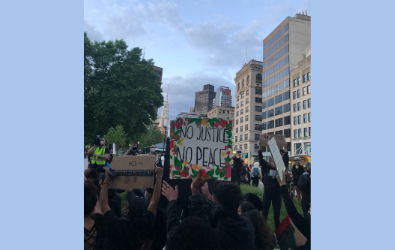Right after she won the U.S. Open, tennis player Naomi Osaka was asked about the series of seven masks she wore before each of her matches during the course of the tournament. Each mask had the name of a different person of color who was the victim of violence. “The point is to make people start talking,” she said. Osaka is the biracial daughter of a Haitian father and a Japanese mother.
In the past, activist athletes from Mohammed Ali to Lebron James were told to “shut up and dribble” when they spoke out about social issues. Thankfully, that’s not the case today. In our current state of turbulence and strife brought on by the intersection of the pandemic health crisis and a long-overdue fight for social justice, athletes are using their powerful voices and platforms to push for positive social change in areas outside of sports. NBA players are giving ideas they believe in like “Black Lives Matter”, “Freedom”, and “Education Reform” top billing on the backs of their uniforms above their last names. During the conference finals, the players wore warmup jerseys emblazoned with a single word “Vote”. After Jacob Blake was shot in the back seven times on August 23rd in Kenosha, Wisconsin, the Milwaukee Bucks, Blake’s hometown team, opted out of playing game 5 of their series against the Orlando Magic. So many other teams followed suit that the league was forced to postpone all the games. Before resuming play, the NBA agreed to several concessions including creating a new league sponsored social justice coalition and working with arena owners to convert stadiums into mass voting locations for the November 3 general election.
The NBA players’ message has resonated with some individual owners as well. The owners of the Boston Celtics launched “Boston Celtics United for Social Justice” and pledged to allocate $25 million over the next ten years to be spent on equity in education, economic opportunity and empowerment, equity in healthcare, criminal justice and law enforcement, breaking down barriers and building bridges between communities and voting and civil engagement.
All major league sports are getting involved in social justice causes. New England Patriots captain Devin McCourty’s support for Boston Uncornered’s mission of using education to end systemic generational urban poverty and gang violence brought awareness of the nonprofit to the audiences of major national outlets like Newsweek, ESPN, and USA TODAY Sports when McCourty was named Uncornered Champion of the Year in June.
People outside of professional sports are also using their power to create change beyond their immediate area of work focus. A group of 19 top Boston business leaders of color-banded together to create the New Commonwealth Racial Equity and Social Justice Fund. They have pledged to raise $100 million to be spent on policing and criminal justice reform, healthcare equity, economic empowerment and youth education. The founder and CEO of nonprofit CDFI Capital Good Fund Andy Posner is using both his and his organization’s social media platforms to push for fair voting in the November 3 election and is urging other similar nonprofits to do the same. “It is impossible for any of us to achieve our mission if we do not have a democracy in which everyone fully participates,” Posner says. He also recommends giving employees the day off on election day November 3 to allow them to vote and volunteer to be poll workers or election monitors.
I’ve been a sports fan all my life. When people ask me why, since I am not an athlete myself, I say it’s because sports is about people working hard to achieve their goals. Seeing athletes and other leaders making the most of their voices, both on and off their respective fields of play, should be an inspiration for us all to get out of our comfort zones and as Osaka says, “start talking” about the issues that affect everyone.


